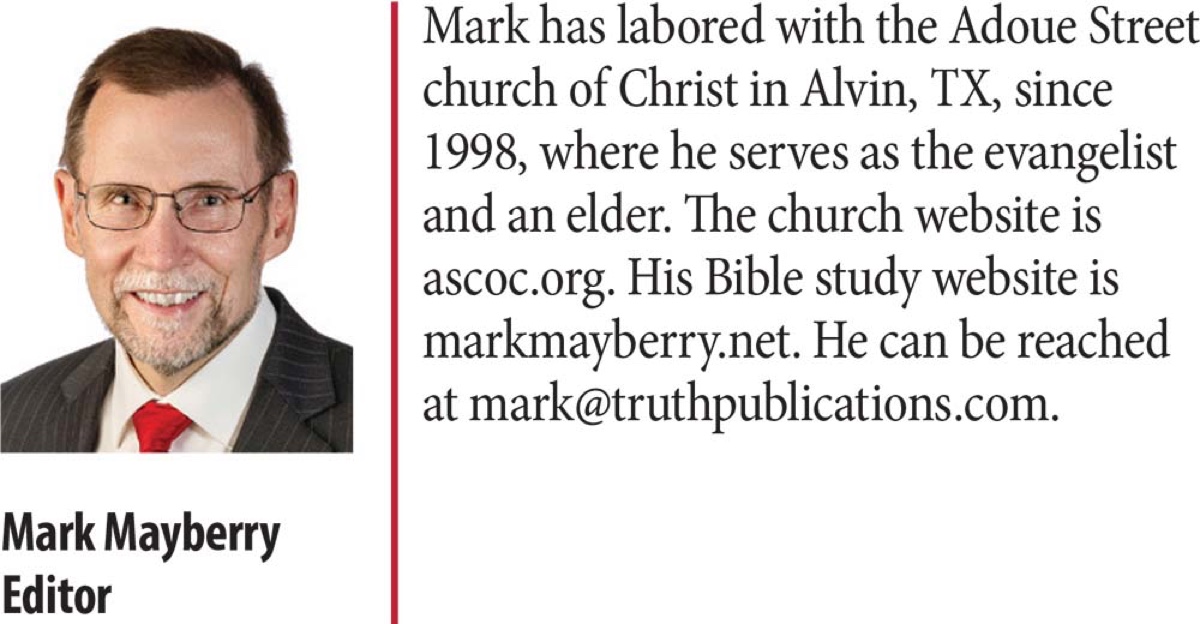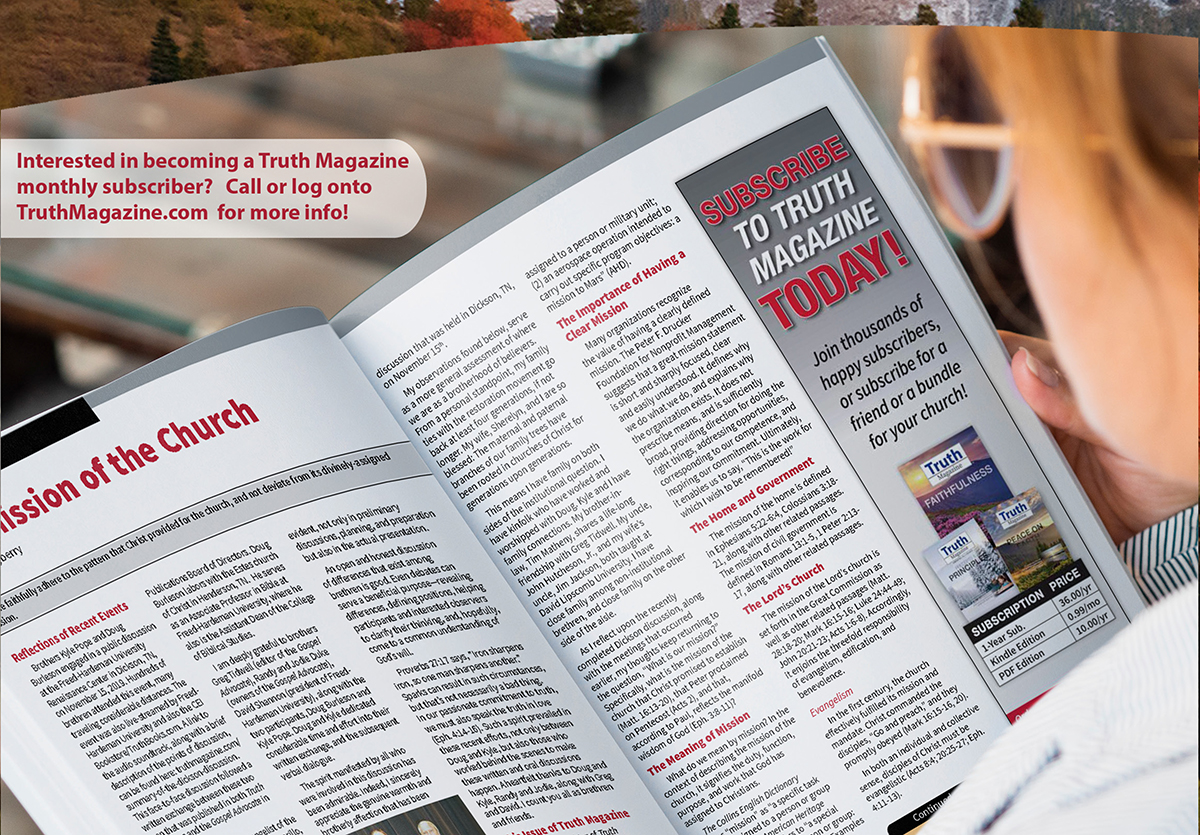
by Mark Mayberry
Synopsis: This issue of Truth Magazine focuses on fellowship. Although the concept is often misapplied and misunderstood, the blessings of biblical fellowship are rich and rewarding.
In the theme section of this issue, we focus on fellowship. In the NT, this concept is communicated by the Greek word koinōnia, which refers to joint participation in a common bond. Please note that the nature of the bond is significant. Husbands and wives share in the joys and responsibilities of the marital relationship (Gen. 2:18-24; 1 Pet. 3:7). Friends share in their mutual affection and combined interests (Prov. 18:24; 1 Sam. 18:1-6) while criminals share in their evil exploitations (Prov. 1:8-19).
The fellowship that we share with God the Father, Jesus Christ, and the Holy Spirit is a blessing beyond compare. While the Lord’s church has been repeatedly troubled over various issues that have strained or severed fellowship (such as the schism that occurred in the 1850s over instrumental music and the missionary society, the division that occurred in the 1950s over institutionalism, the sponsoring church arrangement and the social gospel, or the controversy over marriage, divorce and remarriage that erupted in the 80s and 90s), yet the fellowship that we share with brethren is a joyful interaction that helps us go to heaven.
The Psalmist penned a beautiful tribute to the joys of human fellowship:
Behold, how good and how pleasant it is for brothers to dwell together in unity! It is like the precious oil upon the head, coming down upon the beard, even Aaron’s beard, coming down upon the edge of his robes. It is like the dew of Hermon coming down upon the mountains of Zion; for there the LORD commanded the blessing—life forever (Ps. 133:1-3).
Contemplate the lyrics of “Blest Be the Tie That Binds,” the beloved hymn published by John Fawcett in 1782:
Blest be the tie that binds our hearts in Christian love; the fellowship of kindred minds is like to that above. Before our Father’s throne, we pour our ardent prayers; our fears, our hopes, our aims are one, our comforts, and our cares. We share our mutual woes, our mutual burdens bear; and often for each other flows the sympathizing tear. When we asunder part, it gives us inward pain; but we shall still be joined in heart, and hope to meet again.
Still, the blessings of divine fellowship are even greater. Paul’s greatest aim was to know Christ and be found in Him adorned with a righteousness that permits continued fellowship (Phil. 3:7-10). We enjoy both forms of fellowship (human and divine) through the mediatorial work of Jesus Christ (Gal. 3:19-22; 1 Tim. 2:3-6) and our shared commitment to the inspired apostolic message:
What was from the beginning, what we have heard, what we have seen with our eyes, what we have looked at and touched with our hands, concerning the Word of Life—and the life was manifested, and we have seen and testify and proclaim to you the eternal life, which was with the Father and was manifested to us—what we have seen and heard we proclaim to you also, so that you too may have fellowship with us; and indeed our fellowship is with the Father, and with His Son Jesus Christ. These things we write, so that our joy may be made complete (1 John 1:1-4).
The Word of Life (i.e., Jesus Christ, the Incarnate Son of God) was manifested: “The Word became flesh, and dwelt among us, and we saw His glory, glory as of the only begotten from the Father, full of grace and truth” (John 1:14). The truths that Jesus personified and preached must be courageously and clearly proclaimed (Heb. 2:12). May we, therefore, fulfill Paul’s mandate, “Pay close attention to yourself and to your teaching; persevere in these things, for as you do this you will ensure salvation both for yourself and for those who hear you” (1 Tim. 4:16). We should also heed John’s warning: “Anyone who goes too far and does not abide in the teaching of Christ, does not have God; the one who abides in the teaching, he has both the Father and the Son” (2 John 9).
Faithful Christians preserve the unity of the Spirit in the bond of peace by manifesting a proper spirit toward one another (Eph. 4:1-3), and evidencing a profound respect for the revealed pattern (Eph. 4:4-6). Therefore, let us love one another (1 John 4:7), speaking the truth in love (Eph. 4:15), and being obedient to that form of teaching to which we are committed (Rom. 6:17-18).
Therefore I, the prisoner of the Lord, implore you to walk in a manner worthy of the calling with which you have been called, with all humility and gentleness, with patience, showing tolerance for one another in love, being diligent to preserve the unity of the Spirit in the bond of peace. There is one body and one Spirit, just as also you were called in one hope of your calling; one Lord, one faith, one baptism, one God and Father of all who is over all and through all and in all (Eph. 4:1-6).
At the dedication of the temple, Solomon recognized the blessing and burden of divine fellowship. Worshippers must be mindful of the Lord’s grandeur. Wickedness culminates in condemnation while righteousness results in reward (2 Chron. 6:18-23).
What requisite attitudes and actions does the Lord require of those with whom He shares fellowship? We must be contrite and humble (Isa. 57:15). As David stated, we must walk with integrity, work righteousness, and speak the truth in our hearts (Ps. 15:1-5). As John affirmed, we must walk in the light of God’s revealed word (1 John 1:5-7).
For thus says the high and exalted One who lives forever, whose name is Holy, “I dwell on a high and holy place, and also with the contrite and lowly of spirit[ in order to revive the spirit of the lowly and to revive the heart of the contrite” (Isa. 57:15).
O LORD, who may abide in Your tent? Who may dwell on Your holy hill? He who walks with integrity, and works righteousness, and speaks truth in his heart. He does not slander with his tongue, nor does evil to his neighbor, nor takes up a reproach against his friend; in whose eyes a reprobate is despised, but who honors those who fear the LORD; he swears to his own hurt and does not change; he does not put out his money at interest, nor does he take a bribe against the innocent. He who does these things will never be shaken (Ps. 15:1-5).
This is the message we have heard from Him and announce to you, that God is Light, and in Him there is no darkness at all. If we say that we have fellowship with Him and yet walk in the darkness, we lie and do not practice the truth; but if we walk in the Light as He Himself is in the Light, we have fellowship with one another, and the blood of Jesus His Son cleanses us from all sin (1 John 1:5-7).
The darkest time of history occurred when Jesus was betrayed, arrested, and illegally tried—subjected to mockery, scourging and crucifixion (Luke 22:52-53; 23:44-49). Sadly, when we choose the path of neglect and willful rebellion, this tragedy is repeated on a personal level (Heb. 6:1-8; 10:19-31).
Fellowship with God is conditioned upon our walking in the light. However, He will abandon us if we are filled with foreign influences, false religious concepts, and covetous longings (Isa. 2:5-8; 1 John 1:5-7). Since Jesus Christ brings light to this shadowland of sin (Isa. 9:1-3; John 8:12), let us lay aside the deeds of darkness, put on the armor of light, and walk as children of light (Rom. 13:11-14; Eph. 5:6-14).
Faithful disciples walk in the light of God’s countenance—honoring and upholding righteousness, justice, lovingkindness and truth (Ps. 89:14-16). However, the wicked walk in darkness, having no understanding, lacking all foundation (Ps. 82:5; Isa. 59:1-10). While darkness may seem to prevail in the present, it cannot endure. In the Old Testament era, God employed powerful nations to punish His wayward people, and subsequently judged those nations for their own evils. The Most High still rules over the realm of mankind–raising up and casting down (Jer. 4:11-13; Hab. 1:6). Even in such distressing times, the righteous enjoy stability, experiencing the wealth of salvation, sharing in the treasure of God’s knowledge and wisdom (Isa. 33:1-16). 



